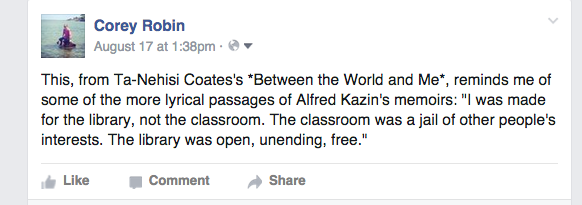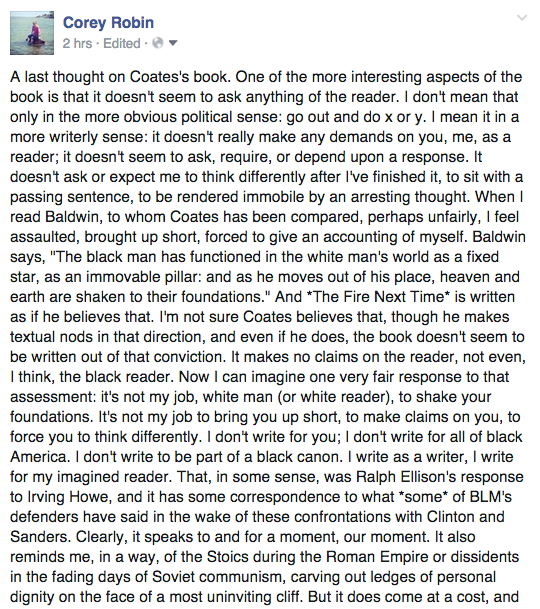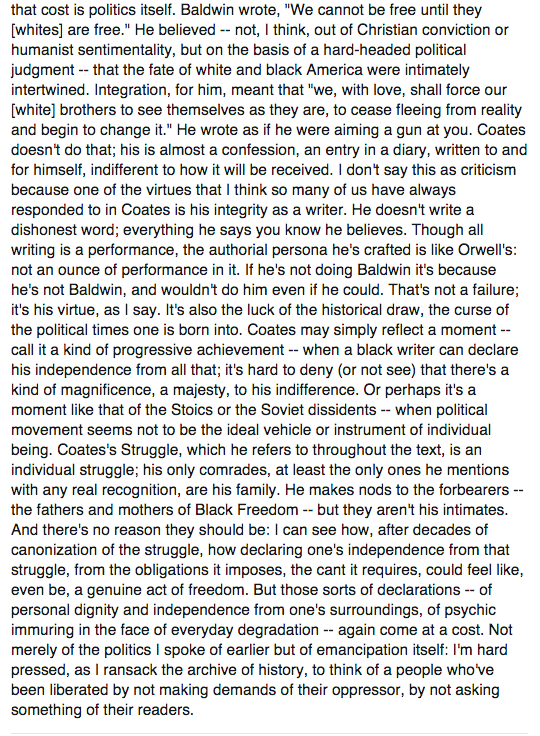Ta-Nehisi Coates: Three Not-So-Easy Pieces
I’ve spent the past few days reading Ta-Nehisi Coates’s Between the World and Me and posting about it on Facebook. Rather than rewriting those posts as a single piece here, I thought I’d take some screen shots, and share them with some additional commentary. A shout-out to my friend Lizzie Donahue, whose queries to me on our daily walk this morning prompted the last and lengthiest post.
Here’s the first post.
And here’s a short addendum to this post, where I comment further on the theme of education and Coates’s discussion of his time at Howard University.
I say here that breaking with the mytho-poetic view of a heroic African past was the second great trauma of Coates’s life. I should be more precise. I mean disillusionment. But it was a disillusionment that was immensely productive. More than the loss of a specific view of things, the break with black nationalism made Coates suspicious of all master narratives, all collective platforms of totality. As an alternative, he turned to the specificity and concreteness of poetry, “of small hard things,” as he says: “aunts and uncles, smoke breaks after sex, girls on stoops drinking from mason jars.” And in that specificity “I began to see discord, argument, chaos, perhaps even fear, as a kind of power.” The “gnawing discomfort, the chaos, the intellectual vertigo was not an alarm. It was a beacon.” This is a writer for whom the struggle to see what is in front of his nose is a lifelong effort, a hard-won right to see things as they are, without mediation or adornment or chastising authority. So much so that it has made him, as we’ll see, suspicious of all collectivities, all platforms.
One other note on education. Coates has a wonderful passage on translation as living. He goes to Europe for the first time, lands in Geneva, heads for the train station, and here’s what he says:
I surveyed the railway schedule and became aware that I was one wrong ticket from Vienna, Milan, or some Alpine village that no one I knew had ever heard of. It happened right then. The realization of being far gone, the fear, the unknowable possibilities, all of it—the horror, the wonder, the joy—fused into an erotic thrill. The thrill was not wholly alien. It was close to the wave that came over me in Moorland. It was kin to the narcotic shot I’d gotten watching the people with their wineglasses spill out onto West Broadway. It was all that I’d felt looking at those Parisian doors. And at that moment I realized that those changes, with all their agony, awkwardness, and confusion, were the defining fact of my life, and for the first time I knew not only that I really was alive, that I really was studying and observing, but that I had long been alive—even back in Baltimore. I had always been alive. I was always translating.
That passage reminded me of this exchange between Peter Cole, the poet and translator, and Joshua Cohen, the author in The Paris Review:
Cole: People say such dumb things about translation.
Cohen: Such as?
Cole: Such as that, unlike so-called original composition, it’s always a matter of compromise, of negotiation—that translation is inevitably a failed approximation, or like a black-and-white photograph rather than color. But what in life that’s valuable over time doesn’t involve negotiation or intelligent compromise? Where does friendship come from? Or marriage? Education? Commerce? A culture? Would you colorize Stieglitz? And who says that original composition is fundamentally different from translation? “Ever tried. Ever failed. No matter. Try again. Fail again. Fail better.” Beckett isn’t talking about translation there, he’s talking about life, or writing, period. Poetry isn’t lost in translation, it is translation. It’s lost only in bad or gray translation—and in the mindless repetition of the thin figures of speech we use to talk about it.
…
Cole: You have to be desperate, at some level, to write anything, no? To move the magic of consciousness and language from one state or place to another. From an itch or an instinct to a line of poetry, and from that line of poetry to the next one, and from these two in combination to a third, and then to a reader. Translation as we normally think of it only raises all that to a higher exponential power. So, yes, there’s desperation, but even more so, at least for me, there’s desire—for nourishment and for pleasure. Translation isn’t some weakly technical craft. It’s a deeply human activity, an essential part of the art of our lives, whether we’re aware of it as such or not. Of course it exists in relation to something, not on its own, and so we think of it as secondary, but hey, so do we exist only in relation to something, as inheritors and animators or deadeners of traditions of all sorts. But that’s my stump speech—deep translation.
Here’s the second post I wrote, on the surprising atheism of Coates’ book.
In re-reading this, I’m reminded of something else I wanted to say. In the last several decades, intellectuals of a pragmatist bent have often affirmed a kind of politics of struggle amid the ruins of God, Marx, and other master narratives. Think Cornel West. What strikes me in reading Coates, though, is just how visceral and personal and punch-in-the-gut powerful the death of God is for him. There’s a moment near the end of the book where he looks at the photographs of civil rights protester, and he asks his son:
Have you ever looked at the faces? The faces are neither angry, nor sad, nor joyous. They betray almost no emotion. They look out past their tormentors, past us, and focus on something way beyond anything known to me. I think they are fastened to their god, a god whom I cannot know and in whom I do not believe. But, god or not, the armor is all over them, and it is real. Or perhaps it is not armor at all. Perhaps it is life extension, a kind of loan allowing you to take the assaults heaped upon you now and pay down the debts later.
There’s nothing easy or cheap or distant about this atheism. Coates is fully aware of its costs: not just personal—the existential agony of the unbeliever—but also political: “I thought of my own distance from an institution [the black church] that has, so often, been the only support for our people.” And he’s still willing to pay them. Because he has no other choice. One cannot compel belief, whether it’s in God or the revolution. This is why I’ve been slightly discomfited by the critiques of Coates that take him to task for his political fatalism. In part because I don’t think that’s quite accurate, as we’ll see below, but also because I don’t know that you can will someone to believe in something they don’t believe.
And here we come to the third post, broken up into two screenshots.
By way of qualification, as Joel Scott Rutstein pointed out to me on Facebook, I should acknowledge that throughout the book, Coates deploys an arresting phrase: the people who believe themselves to be white. Every time I read that, I was indeed brought up short.
Update, 3 pm
Dammit, I meant to include these in my post but forgot. Tressie McMillan Cottom has one of the very few posts that grapple with Coates’s atheism. It’s very smart, though I disagree with her, I think, on the question of the political fallout. Her post led me to this, by Robert Greene, which I also thought quite smart, on the dangers of asking or reading Coates to be a writer other than he is.




